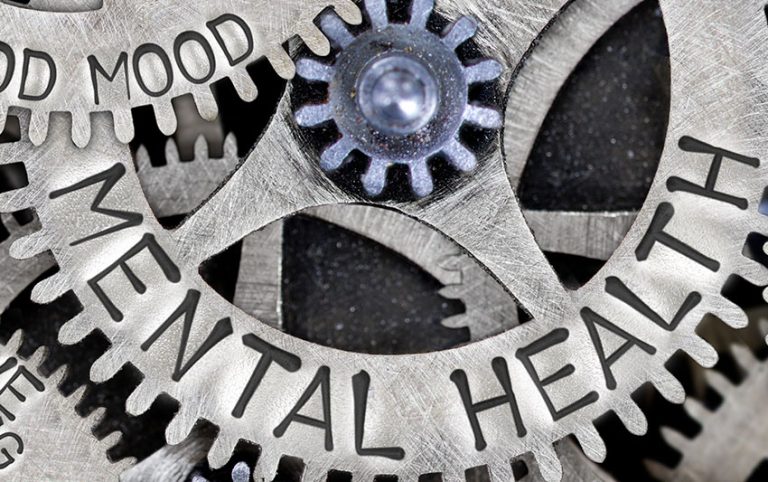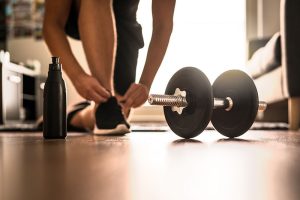The gains you get from working out aren’t just in your arm size. They’re above the neck as well.
Regardless of your fitness level or age, making time for regular exercise provides incredible mental health benefits that last well after your workout. Check out some of the many ways that exercise can help clear your mind, reduce debilitating symptoms and help you achieve a healthier lifestyle.
What Type Of Exercise Is Most Effective?
While specific exercises need to be performed for optimal strength or cardio performance, the protocol is much looser for mental health benefits. It’s all about finding a type of exercise that you enjoy and will commit to regularly doing.
Walk or jog around your neighborhood if you’re able to get outdoors and bring your dog along for the trip. Drive to a park or local hiking trail, go for a bike ride, play active games, or even do some gardening in your backyard. Strength training can start out with simple bodyweight exercises throughout the day such as squats, push-ups, and lunges.
Reducing Stress
There’s a reason that people refer to a “runner’s high” after an extended jog. Whether you’re doing cardio, a WOD (Workout Of the Day), or strength training; exercise is one of the most proven and effective ways to handle stress.
Working out not only releases endorphins that are natural painkillers, but also lowers stress hormones in the body like cortisol. Less cortisol helps you sleep better too.
Exercise boosts the body’s ability to react to stress by forcing the body’s sympathetic and central nervous systems to communicate with one another. Not only can it reduce current stress levels, but it can even repair stress-reduced brain damage by improving your overall mood through stimulating the production of neurohormones like norepinephrine.
Physical activity also plays a positive role in minimizing future stress. A 2012 study out of the University of Maryland found that “moderate exercise may help people cope with anxiety of stress for an extended period of time post-workout.” In other words, the lower levels of anxiety will still be maintained even as you’re faced with common emotional events that can occur throughout the day.
A study published in Health and Fitness Journal notes that 150 minutes of moderate-intensity exercise per week is required to most effectively combat stress levels. But for those short on time, there are even benefits when the exercise is broken into two 15-minute sessions per day. Any movement is better than none at all.
Promote Restful Sleep
Even 30 minutes of exercise per day on a consistent basis can drastically improve the overall quality of your sleep. These benefits can often be obtained right away as well. A poll from the National Sleep Foundation found that exercises reported having longer sleep times and less difficulty both falling and staying asleep compared to non-exercisers.
Remember those hormones I talked about being reduced? This is another place it helps.
The elevation in your core body temperature while being physically active awakens you, but when that temperature naturally start to drop 30 to 90 minutes after working out, it can help generate sleepiness.
It may also decrease insomnia by reducing symptoms of arousal and anxiety.
A growing body of evidence also shows that extended periods of sitting and general inactivity can worsen sleep apnea. The Centers for Disease Control and Prevention notes that people who sit for less than eight hours per day report having better sleep quality than those who sit for longer than eight hours.
Exercise can also help combat fatigue when you don’t achieve your desired amount of sleep. Research from the University of Georgia showed that individuals who exercised over a six-week period reported more energy and lower fatigue than those who did not exercise.
Although there is debate as to whether sleep improvements are most noticeable when working out in the morning compared to the evening, this usually comes down to personal preference. You’ll still see noticeable benefits regardless of when you exercise.
Reduce Depression
An ample body of research shows that exercise can help lower symptoms of depression. A 2004 research project published in Current Psychiatry noted that exercise is more effective at reducing symptoms of depression than cognitive therapy, occupational therapy or meditation. This is particularly important because estimates show that 17% of Americans will experience at least one major episode of depression in their lifetime.
Don’t think that you need to run a marathon in order to ward off these symptoms, though. A study out of the Cooper Research Institute in Dallas, Texas, found that patients reduced their level of mild or moderate depression by 47% simply through walking for 35 minutes, six days per week. Find a friend to commit to early morning jogs with or take your dog for a walk around the neighborhood. Gardening in the backyard also qualifies as moderate physical activity.
Incorporating exercise as part of your daily routine will make it easier to stick with. This could include laying out your workout clothes the night before or putting on your jogging shoes as soon as you get out of bed.
However, it’s important to note that exercise alone likely won’t be enough to treat severe cases of depression. Consult with a doctor or medical professional if your depression becomes debilitating to the point that it interferes with daily functioning.
Boost Self-Esteem
Physical activity can help provide a positive impact on self-esteem. Through goal setting, committing to a program and the mental and physical benefits that come with regular exercise, you’ll gain confidence in achieving your goals and pushing beyond your expectations.
A study from the International Journal of Sport Psychology found that participants who stuck to a consistent workout routine for six months reported having increased levels of self-confidence. You don’t need to wait months to see these results, though. The endorphins that exercise releases will lead to a feel-good mood and higher levels of positive feelings right after the workout. All it takes is 30 minutes of moderate aerobic exercise for these endorphins to start flowing.
Brain Boost
The mental benefits of exercise aren’t limited to how you feel. Several research projects have shown that consistent exercise at moderate intensity can help improve your thinking and memory in six months.
This change occurs directly and indirectly. Exercise stimulates physiological changes such as lowered levels of inflammation and insulin resistance while also boosting the production of chemicals that impact blood vessel growth in the brain. Physical activity also boosts overall quality in areas that contribute to cognitive functioning such as mood as sleep.
A study published in the Journal of the American Geriatrics Society found that older adults showed improved cognitive functioning through regular tai chi sessions. Although this form of exercise is done at a slower pace, the focused movements require learning new movement patterns and skills.
Separate research published in the Journal of Alzheimer’s Disease showed that older adults who maintained an aerobic exercise routine for 12 months boosted their blood flow and significantly improved neurocognitive functions. The participants in the “aerobic exercise” group, all of whom showed symptoms of mild cognitive impairment before beginning their program, improved their memory scores by 47 percent. Their memory scores also showed greater levels of improvement than a separate group which only engaged in gentle stretching.
“We’ve shown that even when your memory starts to fade, you can still do something about it by adding aerobic exercise to your lifestyle,” said Binu Thomas, lead study author. “Cerebral blood flow is a part of the puzzle and we need to continue piecing it together. But we’ve seen enough data to know that starting a fitness program can have lifelong benefits for our brains as well as our hearts.”
This brain boost isn’t just limited to older adults, though. Scientists at Bristol University concluded that adults who exercised at lunch time improved their concentration levels by 21% on those days. In addition, kids who engaged in exercise showed higher levels of focus and concentration in class than their peers who did not.
Reduce PTSD Symptoms
Individuals with PTSD, short for post-traumatic stress disorder, often don’t engage in regular exercise. They typically fear bodily symptoms that spark anxiety, such as shortness of breath or increased heart rate, and exercise naturally causes these sensations. PTSD is also commonly linked to depression and the low motivation that comes with this condition can often make it difficult to keep a consistent workout plan.
However, exercise can play a vital role in helping people with PTSD regain their confidence. It can also help address many of the physical and mental health problems commonly associated with chronic PTSD. Recent empirical findings in one study showed that the participants who engaged in strenuous exercise, including cycling or running, reported less hyperarousal. They also reported better sleep quality, less pain and reduced substance abuse.
Separate findings looked at adults with PTSD who engaged in a 12-week exercise program that included at least three 30-minute resistance training sessions per week. The participants overwhelmingly reported a significant decrease in PTSD and depression symptoms, as well as an increase in sleep quality.
Exercise alone is not an adequate treatment plan for PTSD, though. Be sure to talk to your doctor or mental health provider before beginning a workout program in order to ensure that you do it safely.
Prevent Cognitive Decline
The Journal of Alzheimer’s Disease also published a study that showed aerobic exercise may help slow shrinkage in the hippocampus, which is the part of the brain that deals with memory. The study focused on participants over age 55 with mild cognitive impairment. Those who did aerobic training for 30 minutes at least four times per week lost less volume in the hippocampus than those who only did flexibility training.
“The finding that both aerobic and stretching exercise prevented cognitive decline is similar to previous studies in cognitively normal older adults,” said lead researcher Dr. Rong Zhang. “What’s surprising is that it was aerobic, not stretching exercise, that reduced hippocampus atrophy in those who already have a lot of amyloids in the brain.”
Additional research from Rush University Medical Center found that active older adults may keep more of their cognitive abilities than those less active, even if they have brain lesions or biomarkers linked to dementia. The results of this study were published in the journal Neurology.
The association between activity and scores on cognitive tests remained even when researchers adjusted for how severe a participant’s brain lesions were. The relationship was also consistent in people who had dementia and those who didn’t. Researchers also found that participants who showed better movement and coordination had sharper memory and cognition.
Boost Creativity
While going for a run and your writer’s block might seem like two separate things, physical activity helps clear your mind and tap into your creativity. A recent study from Frontiers in Human Neuroscience showed that participants who exercised at least four times per week thought more creatively in a series of tests than those who lived a more sedentary lifestyle.
Certain forms of exercise might be more beneficial for getting your creative juices flowing, though. A paper published in the journal PLOS ONE found that outdoor exercise is more beneficial than running on an indoor treadmill. Researchers found that a natural environment, away from distractions like technology, produces a stimulating impact on the brain.
Low-impact exercises such as gentle cycling or jogging are also more beneficial for creative boosts because strenuous activities require a greater amount of focus that can take away from the creative process. However, these effects only last for two hours after the exercise, so start writing or painting shortly after you finish!
TTP Fitness has helped hundreds of people achieve their fitness goals by making exercise a challenging and rewarding activity that becomes part of their lifestyle. Drop an e-mail, shoot us a DM, or give us a call and let us know how you’d like your life to change.







